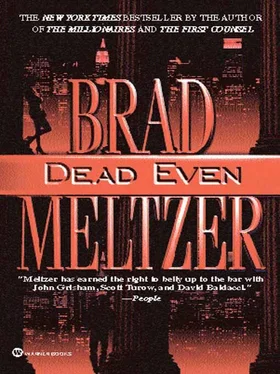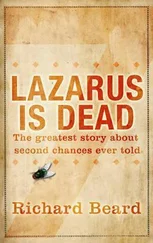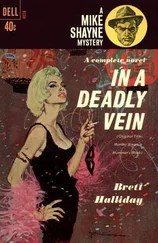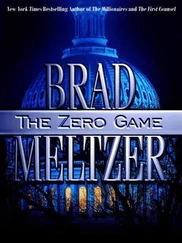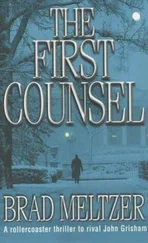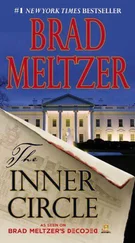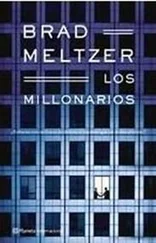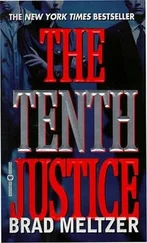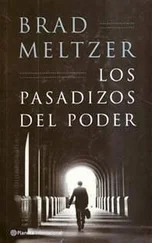“Like a dream,” Sara responded. When they reached the kitchen, Sara once again approached Doniger. “So on the night you say he died, this is where you gave him his apple juice and granola bar?”
With a sour look, Doniger said, “I don’t need your accusations. Kozlow was a burglar – nothing more.”
“Whatever you say,” Sara said. “Now can you point us to the basement?”
“Why do you want to see the basement?” Doniger asked.
“We just want to see if there’s any other way a burglar might’ve snuck in,” Guff said. “If there is, it’ll help your story.”
Doniger stared at Guff, deciding what to do. Finally, she offered, “It’s the door right behind you. The light switch is on your right.”
As they made their way down the stairs, Guff realized Doniger was no longer following. “By the way,” he whispered to Sara, “you don’t have the authority to sign a search warrant. You need a judge.”
“I know that,” Sara smiled. “But she doesn’t. And now that we have her consent, we can search anywhere we want.”
“Cute trick. Now what exactly are we looking for?”
“I’m not sure. All he said was to check the basement.” When Sara and Guff reached the bottom of the stairs, they found themselves staring at what appeared to be Arnold Doniger’s home office. On the far wall was a small wooden desk, a two-drawer file cabinet, and a personal computer. There was a Princeton reading chair in the corner of the room and a packed-to-capacity bookshelf on the right-hand wall. On the left wall was a perfectly preserved six-foot-long sailfish – apparently a trophy from a successful fishing trip – and a doorway that led to a storage room full of empty boxes and old furniture. The other two walls were covered with old photographs and other personal effects: pictures of Arnold Doniger when he was in the navy, photos of him on his sailboat, and one large portrait from his and Claire’s wedding.
“Nice picture,” Guff said, looking at the wedding photo. “They look really happy.”
“It’s sick, isn’t it?” Sara asked. “One day you’re wearing the white dress; ten months later, you’re wearing the black.”
“Welcome to the world of prosecution,” Guff said.
Sara read through a framed article from Avenue magazine next to the photo of the couple.
“Anything interesting?” Guff asked.
“Define ‘interesting,’” Sara replied. “According to this little society-page story, when Claire and Arnold were planning their wedding at the Pierre, Claire hated the curtains in the Cotillion Room so much, she had new ones made just for their wedding. Apparently, the Pierre refused to replace them, so Claire paid for them herself. Then, when the wedding was over, she just left them there – obviously they were too big to take home. The funny part is, the Pierre liked what she did so much, they left them up, and Claire’s curtains are still there today – making her the talk of the town for at least a full ten minutes.”
“So you’re saying Claire’s the type of person who enjoys a good roll in the dough?”
“If you’re asking me if she likes this lifestyle, I’d say the answer is yes.”
As Guff approached Arnold’s desk, Sara suggested, “You take the desk; I’ll take the rest of the room.”
Fifteen minutes later, they hadn’t found a thing. Frustrated, Guff started lifting each photograph to look behind it. “What’re you doing?” Sara asked.
“I’m not sure. Maybe I’ll find a secret passage, or a used syringe, or something cool like that. You got any better ideas?”
“Not really,” Sara said, stepping through the doorway that led to the other half of the basement. She saw an old, worn love seat, a set of four wooden kitchen chairs, and a variety of empty computer, stereo, and kitchen appliance boxes. She also saw a clear glass door that looked like it led to an industrial refrigerator. When Sara pulled the door open, a blast of cool air hit her in the face.
“What’s that?” Guff asked.
Sara flipped on the light switch and stuck her head inside. At least three hundred bottles of wine were perfectly stacked in the cooler.
“Son of a bitch,” Sara said. She eyed the back of the six-by-six-foot wine cellar, pulled a pen from her briefcase, and jotted a note to herself. She then stepped back into the storage room, a knowing glare lighting her eyes.
“What’s the big deal?” Guff asked. “It’s just a wine cellar.”
“That’s not all it is,” Sara said, leaving the room. “Let’s get out of here.”
Sitting in Fawcett’s office in the basement of the medical examiner’s building, Sara waited for Guff to get off the phone.
“No, I understand,” Guff said. “But do you think it’s possible?”
As Guff waited for his answer, Fawcett walked in and sat behind his desk. “Who’s he talking to?” he asked Sara.
“Chillington Freezer Systems. They made the actual cooling unit for Doniger’s wine cellar.”
“Yeah. Yeah. No, I agree,” Guff said. “Thanks again for the help.” When he put down the phone, he turned to Sara and Fawcett. “Well, the wonderfully helpful customer-service people at Chillington said that a wine cellar is normally set at fifty-five degrees, and anywhere between fifty-five and eighty percent humidity, depending on the conditions of the room.”
“I don’t care about wine preservation,” Sara said. “I want to know how cold their freezers can get.”
“That’s the thing,” Guff said. “A wine cellar isn’t a freezer. It’s designed to chill, but not to get much lower than that.”
“So how low-”
“Relax, I’ll get there,” Guff said. “According to the woman on the phone, you can manually turn the temperature down to somewhere between forty-five and fifty degrees. But if you turn off the dehumidifier and the reheat coil, and the room doesn’t get any sun-”
“Like a basement.”
“Exactly,” Guff said. “In a room like a basement, you might be able to get it down to twenty or twenty-five degrees.”
“I knew it!” Sara shouted, slapping Fawcett’s desk. “I knew it the moment I saw it!”
“Would someone mind telling me what’s going on?” Fawcett asked. “Why the sudden fascination with wine cellars?”
“Because of what you said in the autopsy,” Sara explained, pulling out the preliminary draft of Fawcett’s report that she was keeping her notes on. “You said that Mr. Doniger had some tearing in the lining of the brain, and that it might be caused by intense cold or freezing temperatures. Here’s our intense cold. That’s how they kept the body from smelling up the entire house, and that’s how they made it look like he died days after the burglary – they stuffed him in the wine cellar and turned the cold on full blast. Originally, I’ll bet they planned to just call an ambulance the next morning and say that her diabetic husband had died. But when Patty Harrison called in a burglary and Kozlow got arrested, they had to improvise.”
“What about the stuff in his pockets?” Guff asked. “The golf ball and the diamond watch?”
“My guess is Kozlow was being greedy. He probably grabbed them on the way out, hoping no one would notice. Clearly, he didn’t know he’d be arrested minutes later. Then, when the cop brought him back to the Donigers’ house, the cop asked Claire if she’d been burglarized. She had no choice but to go along with the burglary story. At that point, it was better than saying Kozlow was over there to kill her husband.”
“It’s certainly possible,” Fawcett said. “A few years ago, there was a man who tried something similar with his dead wife. As I remember it, he put her in a meat freezer until his step-children left for vacation.”
Читать дальше
